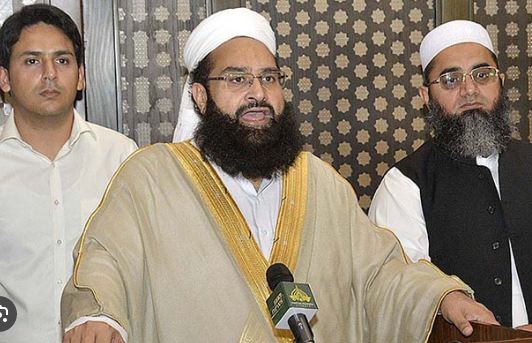DNA
Special Representative to the Prime Minister on Religious Harmony and the Pakistani Diaspora in Middle East and Islamic Countries, Hafiz Muhammad Tahir Mehmood Ashrafi on Sunday said Saudi Arabia, a key regional player in the Middle East, continued to play a crucial role in addressing the ongoing conflict between Palestine and Israel.
Addressing the media at the conclusion of the Joint Arab-Islamic Extraordinary Summit in Riyadh, he underscored the imperative of executing the declarations articulated during this significant gathering of Muslim world leaders regarding the Palestine issue.
Ashrafi who is also the Chairman of Pakistan Ulema Council, necessitated mutual understanding and collaborative endeavors to realize shared objectives. He said as the situation in the region remains tense, the Kingdom’s diplomatic efforts, humanitarian support, and commitment to a just resolution had garnered global attention.
He noted that the participation of Iranian President Ebrahim Raisi, Turkish President Recep Tayyip Erdogan, Palestinian President Mahmoud Abbas, Egyptian President Abdel-Fattah El-Sisi, Jordanian King Abdullah, Amir of Qatar Tamim bin Hamad Al Thani, Pakistani Caretaker Prime Minister Anwaar-ul-Haq Kakar, and other dignitaries at the summit was a testament to their collective determination to pursue both temporary and permanent resolutions to the Palestine issue in the current circumstances.
Ashrafi said Saudi Arabia had been actively engaged in diplomatic efforts for an immediate ceasefire and to seek a peaceful resolution to the conflict mentioning that the Kingdom’s leadership had conducted high-level discussions with various international counterparts, emphasizing the importance of ending the hostilities and achieving a comprehensive peace agreement.
He said Saudi Arabia and other Islamic countries were consistently advocating for a two-state solution as the basis for a lasting peace. “This solution envisions an independent Palestinian state coexisting alongside Israel, with mutually agreed-upon borders and East Jerusalem as the capital of Palestine,” he maintained.
Ashrafi said the Kingdom had provided financial assistance to the Palestinian authority, helping it maintain essential public services and meet the needs of its population. He said Saudi Arabia’s support would contribute to the stability of Palestinian governance.
During this time of conflict and crisis, he said Saudi Arabia had extended humanitarian assistance to the Palestinian people. He said the King Salman Humanitarian Aid and Relief Centre (KSrelief) was playing a critical role in delivering humanitarian aid, including medical supplies, food, and financial support, to address the urgent needs of Palestinians.
He said Saudi Arabia along with other Muslin nations had consistently criticized Israeli actions that had resulted in civilian casualties and damage to civilian infrastructure. He further said the Kingdom had strongly condemned attacks on Palestinian civilians and called for an immediate end to violence.
As the Custodian of the Two Holy Mosques, King Salman bin Abdulaziz Al Saud holds a special place in the hearts of Muslims worldwide, Ashrafi said his leadership and moral authority enabled Saudi Arabia to advocate for the rights of Palestinians, particularly concerning the status of Jerusalem and its holy sites.
He said Saudi Arabia had sought to leverage its diplomatic relations with both regional and global powers to broker ceasefire and de-escalation during this heightened tension in the Palestine-Israel conflict.
He said the Kingdom had actively participated in multilateral efforts aimed at addressing the situation, including discussions with the Arab League, the Organization of Islamic Cooperation (OIC), and the United Nations, with the goal of reaching a just and lasting solution.
He said Saudi Arabia recognized that a peaceful resolution to the Palestine-Israel conflict was essential for regional stability. By advocating for peace and supporting the Palestinian cause, he said the Kingdom contributed to a more secure and prosperous Middle East.
In conclusion, Ashrafi said Saudi Arabia’s role in the current Palestine-Israel situation was marked by its unwavering commitment to the rights of the Palestinian people and its determination to contribute to peace in the region.
He said the Kingdom’s multifaceted approach including diplomatic initiatives, humanitarian aid, and advocacy on the global stage, all aimed at achieving a comprehensive and just solution to the ongoing conflict.
He said Saudi Arabia’s commitment to peace remained a central element of international efforts to address this enduring and complex issue.












